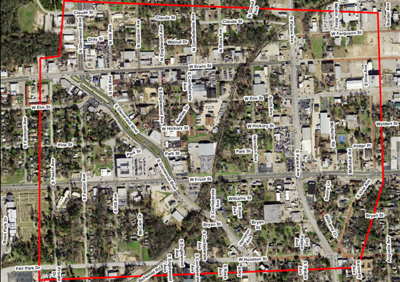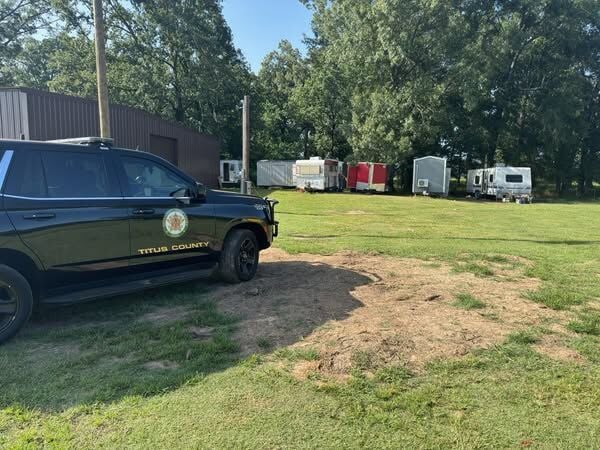UPDATE: Tyler hopeful boil water notice can be lifted Wednesday
Published 2:18 pm Tuesday, May 23, 2017

- Courtesy of the City of Tyler
The Texas Commission on Environmental Quality was in Tyler Tuesday testing the city’s water – a step in lifting the boil water notice issued for a portion of the city.
The boil water will remain in effect through Tuesday, but the city is hopeful it can be lifted on Wednesday.
The notice was issued to about 400 residential customers within a specified area – bounded by Claude Street to the north, West Houston Street to the south, Vine Avenue to the east and South Peach Avenue to the west.
The boil water notice was enacted due to low chlorine residuals found in the area. The state mandates a minimum threshold for chlorine in drinking water.
The TCEQ was in Tyler testing its chlorine residuals on Tuesday and sent off water samples to test for bacteria in the water, said Julie Goodgame, administrative manager of communications, downtown arts and culture.
The bacteria test should take 24 hours to come back from the lab, she said. It was sent off at 11 a.m. Tuesday, but the city is hoping to have it back Wednesday morning.
The city of Tyler believes low water demand was the root cause of a boil water notice issued for a portion of Tyler Water Utilities customers on Friday.
The notice was issued because a standard chlorine test showed chemical residuals below the state threshold.
It went out to about 400 residential customers within a specified area – bounded by Claude Street to the north, West Houston Street to the south, Vine Avenue to the east and South Peach Avenue to the west.
It also affected several commercial customers, including a gas station, a day care and Loggins Restaurant, which is closed until the notice lifts.
Bottled water is available to those in the affected area at the Tyler Police Department, 711 W. Ferguson St. The location is open 24 hours a day, seven days a week. Offering bottled water is not a state requirement, rather a courtesy on the city’s part. City officials said a case of bottled water was distributed with the boil water notices to every affected home.
The state mandates water in the distribution system have a minimum chlorine residual at every point in the system.
If there’s not enough demand for water, it sits in the pipes. Chlorine naturally dissipates over time, causing the water to stagnate.
The city uses chloramines – a mixture of chlorine and ammonia – to disinfect its water. The advantage of the mixture is that it’s more stable in the pipes, and gives the chlorine a longer life, allowing it to reach further in the system from the water plants.
For that method of disinfection, the state requires .5 milligrams of chlorine be present per liter, said Lisa Crossman, director of Tyler Water Utilities.
Ms. Crossman said 100 test sites that are tested monthly across the city. They are not done all at once, rather a few a day in each region until the monthly checklist is complete.
On Friday, two tests were found below the threshold. Those included a test on Glenwood Street, at Loggins Restaurant. That test showed .04 milligrams per liter. The second was on Front Street, near an East Texas Medical Center office. That reading was .03 milligrams per liter.
A test in the area done on May 1, on Peach Street, was compliant at 0.5 milligrams per litter.
A consultant, Emprotec and Hibbs, will be brought on board to confirm the city’s hypothesis and evaluate ways to prevent future boil notices.
The boil water notice was still in effect as of Monday, and would continue for at least another 24 hours, Ms. Crossman said.
City officials said the chlorine residual was back up for a majority of the area, but there were two problem spots that were still being worked on. Once those were addressed, the Texas Commission on Environmental Quality would come in to verify the readings, which would take 24 hours to get back.
Crews have been flushing water out of the system through hydrants, which pulls older water out of the system to be replaced with a fresher stock.
Ms. Crossman said the residual wasn’t coming up as fast as hoped, so the city enacted a free chlorine conversion, where the water department would no longer add ammonia to the water, and instead solely use chlorine. This will last for 30 days while the city works with the consultant on the issue.
The advantage is chlorine reacts faster to bacteria in the system and is a more powerful disinfectant.
For free chlorine, the state requires a residual of .2 milligrams per liter, Ms. Crossman said.
“We are hoping that by using a higher dose of chlorine in the distribution system we can get the residuals back up and get the boil water notice lifted,” she said. “The residuals are up in most of the affected area, but we are still having issues in two isolated areas. We have crews working in those areas to install additional flushing mechanisms so we can get the water moving through those pipes so we can get those residuals back up.”
The last time the city issued a boil water notice was in 2014, Ms. Crossman said. That notice affected five homes. Prior to that, the city went decades without a boil water notice, she said.
TWITTER: @TMTFaith






